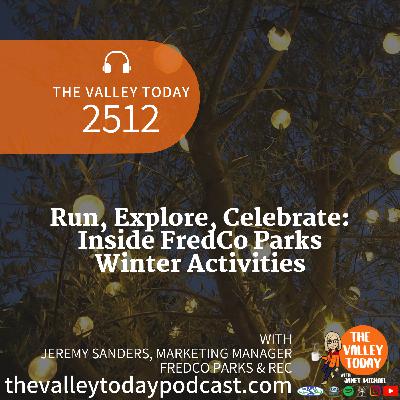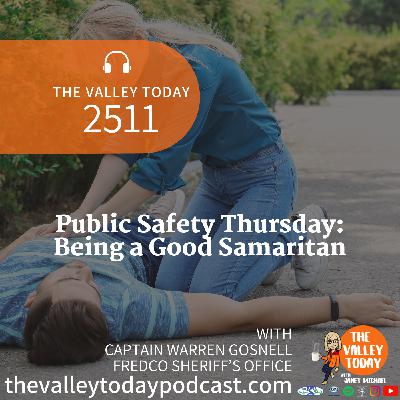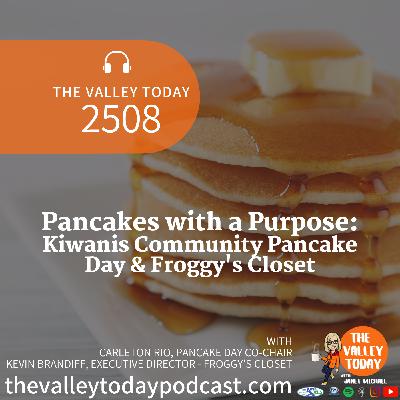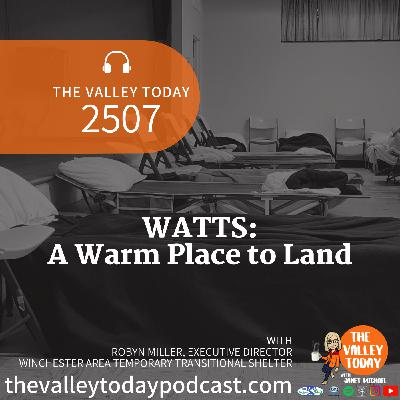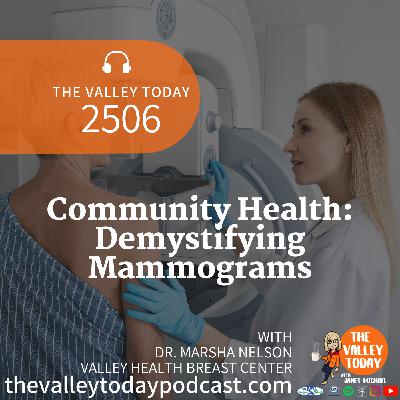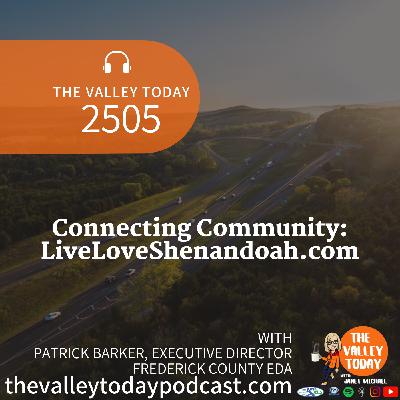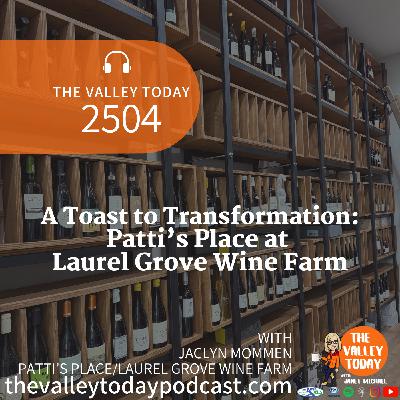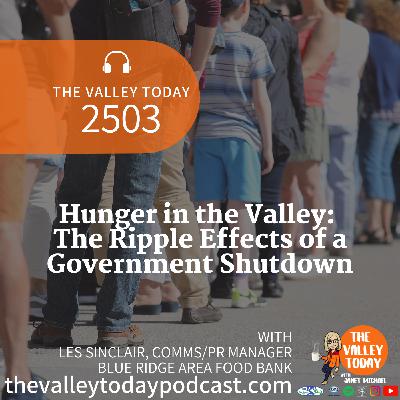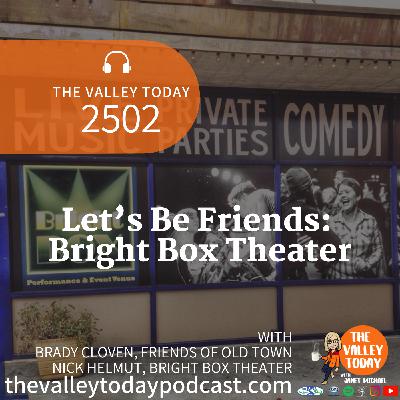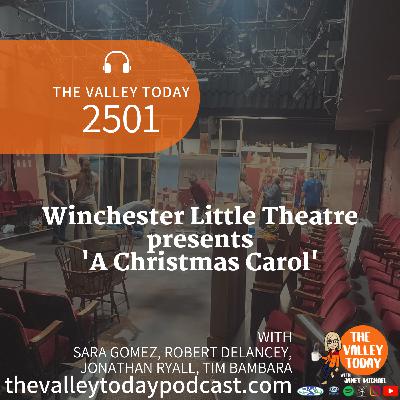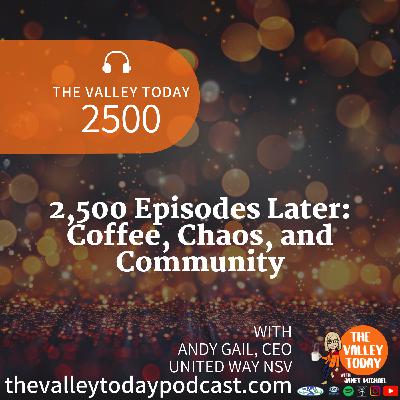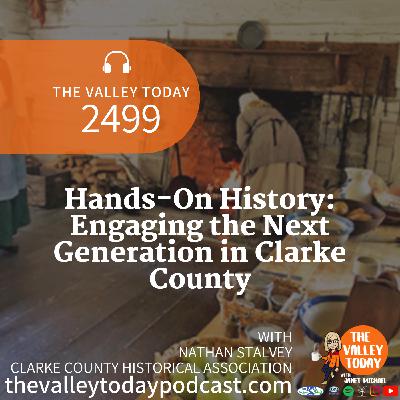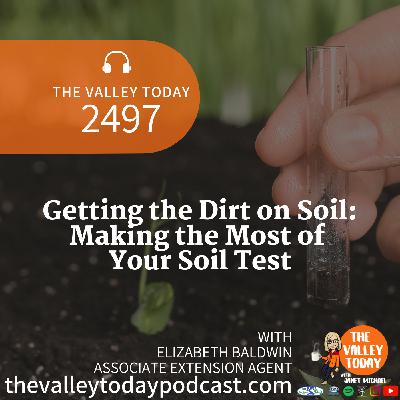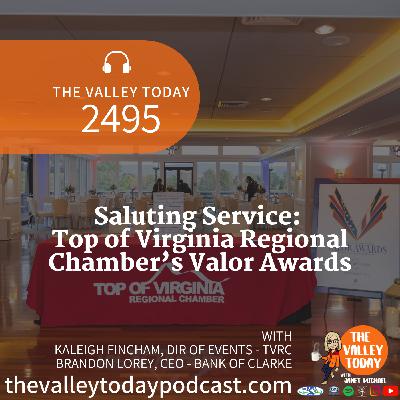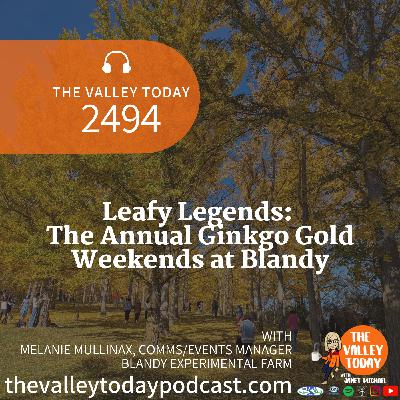Discover The Valley Today
The Valley Today

The Valley Today
Author: Janet Michael
Subscribed: 2Played: 100Subscribe
Share
© 2025 The Valley Today
Description
The Valley Today is a radio show and podcast dedicated to shining a light on the vibrant community leaders and local events that make the Shenandoah Valley of Virginia truly special. Insightful conversations, engaging stories, and event details connect listeners with the heart and soul of the valley, showcasing its unique culture, initiatives, and people.
Guests are recorded (mostly) in advance in local coffee shops, at local businesses, and during local events. The radio program airs just a few minutes after noon every weekday on The River 95.3 and Sports Radio 1450.
Guests are recorded (mostly) in advance in local coffee shops, at local businesses, and during local events. The radio program airs just a few minutes after noon every weekday on The River 95.3 and Sports Radio 1450.
2388 Episodes
Reverse
When the temperature drops and snowflakes start to fall, many assume that local parks and recreation departments take a well-deserved break. However, as Valley Today host Janet Michael discovers in her lively conversation with Jeremy Sanders, Marketing Manager for Frederick County Parks and Recreation, winter is anything but a slow season. Instead, the department ramps up its offerings, ensuring that residents of all ages have plenty of opportunities to stay active, engaged, and connected. The Winter Guide: A Treasure Trove of Activities At the heart of their conversation is the newly released Winter Guide, available both online and soon in print. This comprehensive resource is packed with information about upcoming races, trips, crafting workshops, and sports leagues. Jeremy emphasizes that the guide is designed to appeal to a wide range of interests, from seniors looking for social activities to families seeking ways to get out of the house during the colder months. Notably, the guide also highlights job opportunities for teens and young adults, providing a gateway into the world of parks and recreation. Signature Events: From Turkey Trots to Winter Wonderland Transitioning from the guide's overview, Janet and Jeremy dive into some of the season's most anticipated events. The Thanksgiving Day 5K, a beloved local tradition, has grown so popular that it sold out last year, prompting organizers to raise the participation cap for this year's race. Jeremy shares the behind-the-scenes logistics of managing such a large event, from volunteer coordination to ensuring enough t-shirts and medals for all runners. The race isn't just for adults—kids can join in the fun with their own "tot trot," making it a true family affair. Following Thanksgiving, the excitement continues with Winter Wonderland at Clearbrook Park, now celebrating its 25th anniversary. This walk-through light display features festive activities, food trucks, live music, and even pony rides. Jeremy notes that the event has evolved to include selfie stations and crafting opportunities, ensuring that there's something for everyone, whether you have young children or are simply young at heart. Community Input and Creative Programming One of the most engaging aspects of the conversation is the discussion about how new programs are developed. Jeremy reveals that many ideas originate from staff members' personal interests or from suggestions by community members. For example, after attending a conference, Jeremy was inspired to introduce "letterboxing," a creative outdoor activity similar to geocaching, to the local parks. This openness to innovation ensures that the department's offerings remain fresh and relevant. Trips, Tours, and Togetherness Beyond local events, Frederick County Parks & Rec organizes a variety of trips throughout the winter. Whether it's a bus ride to a Penn State football game, a shopping excursion to New York City, or a visit to the Polar Express Ice Show, these outings provide residents with hassle-free ways to explore new places and make new friends. Janet and Jeremy both agree that the camaraderie of group travel adds an extra layer of enjoyment to these experiences. Staying Informed and Getting Involved To keep the community informed, the department offers an email newsletter, the "Rec Reminder," which highlights upcoming deadlines and new programs. Registration for events and activities is streamlined through the department's website, making it easy for residents to sign up and even add events directly to their digital calendars. Looking Ahead: A Season of Connection As the conversation wraps up, Janet and Jeremy reflect on the importance of community, tradition, and adaptability. Whether you're lacing up your sneakers for a 5K, crafting a holiday wreath, or simply enjoying a stroll through Winter Wonderland, Frederick County Parks & Rec ensures that winter is a season to remember. With a blend of beloved traditions and innovative new offerings, the department continues to bring people together—proving that, in Frederick County, the fun never freezes.
On a crisp November day, "The Valley Today" welcomes listeners with its signature blend of warmth and wit. Host Janet Michael and Captain Warren Gosnell of the Frederick County Sheriff's Office kick off their monthly Public Safety Thursday segment with playful banter about radio nostalgia, technical hiccups, and the quirks of live broadcasting. Their camaraderie sets a relaxed tone, inviting the audience into a conversation that would soon delve into the heart of community service. Navigating Change and Tradition As the discussion unfolds, Janet and Captain Gosnell reminisce about the evolution of radio technology and the enduring challenges of adapting to new tools. Their exchange highlights not only the humor in everyday mishaps but also the resilience required in both broadcasting and public safety. Captain Gosnell's anecdotes about his new vehicle and the familiar roads of the Shenandoah Valley paint a vivid picture of local life, complete with autumn leaves and the ever-present specter of roadwork. The Valor Awards: Recognizing Bravery Transitioning to the evening's main event, Janet introduces the upcoming Top of Virginia Regional Chamber's Valor Awards, a ceremony dedicated to honoring first responders and citizens who have gone above and beyond in moments of crisis. Captain Gosnell emphasizes the significance of such recognition, sharing personal stories of lifesaving interventions and the humility that comes with being acknowledged for simply "doing the job." He reflects on the emotional impact of these awards—not just for law enforcement, but for EMTs, firefighters, and ordinary citizens whose quick thinking has saved lives. The Pendulum of Public Perception Throughout the conversation, Captain Gosnell addresses the shifting public perception of first responders. He notes that while moments of extraordinary heroism—such as those witnessed during 9/11—can elevate the status of public safety professionals, negative incidents can just as quickly cast a shadow over the entire field. This pendulum effect, he explains, underscores the importance of community support and positive reinforcement, both for morale and for the continued dedication of those in uniform. Celebrating Citizen Heroes Importantly, the Valor Awards do not solely spotlight professionals. Janet and Captain Gosnell discuss the vital role of private citizens—children who call 911 in emergencies, bystanders who administer CPR, and neighbors who step in during crises. These stories, often overlooked by the media, demonstrate the profound impact that ordinary people can have when they choose to act. Captain Gosnell encourages listeners to learn basic lifesaving skills, such as CPR and Narcan administration, reminding everyone that heroism is not limited to those with badges. The Ripple Effect of Good Deeds As the conversation draws to a close, the pair turns to the broader effects of intervention. Saving a life, Janet observes, can have far-reaching consequences, touching families and communities in ways that may never be fully known. Captain Gosnell echoes this sentiment, sharing how even unsuccessful rescue attempts are deeply appreciated by those affected. The message is clear: every act of courage, no matter how small, contributes to the fabric of a safer, more compassionate community. Looking Ahead With gratitude and anticipation, Janet and Captain Gosnell conclude the show by congratulating the evening's Valor Award recipients. Their conversation serves as a powerful reminder that heroism is all around us—sometimes in uniform, sometimes in everyday clothes, but always in the willingness to help.
Mental health care is changing — and Dr. Matthew Rosario, founder and Chief Clinical Director of Clear Horizons Counseling Group, is helping to lead that transformation. In a candid and wide-ranging conversation on The Valley Today, host Janet Michael and co-host Niki Foster from the Front Royal/Warren County Chamber talk with Dr. Rosario about his passion for community-based care, his mission to make therapy more accessible, and why empathy and structure are the true foundations of healing. A New Model for Mental Health Care Dr. Rosario founded Clear Horizons to address the gaps he saw in traditional therapy. Rather than confining care to an office, his team meets clients where they are — literally and figuratively. "We're helping humans, not numbers," he explains. Instead of relying on the conventional 45-minute session, Clear Horizons offers community-based mental health and substance abuse treatment for youth and adults, including those involved with the Department of Juvenile Justice and Department of Corrections. By immersing themselves in their clients' real environments, Dr. Rosario and his staff gain a deeper understanding of the struggles people face each day. He emphasizes, "It's not just about talking. It's about seeing, listening, and walking alongside someone in their reality." Therapy That Meets People Where They Are Dr. Rosario rejects the idea that therapy should end when the clock runs out. His team remains available to patients, even outside business hours. "If a client needs me at nine o'clock at night because they're in crisis," he says, "I'd rather they call me than end up in the hospital." That human-first approach extends to Clear Horizons' payment model as well. The organization does not deny care based on a person's ability to pay, nor does it charge copayments. "If insurance pays, great," he notes. "If not, we still serve you. I'm not here to work for the insurance company — I'm here to work for the person." Beyond the Couch: Therapy for All Ages Clear Horizons operates offices in Front Royal, Fredericksburg, Richmond, and soon Norfolk, serving clients as young as six years old. Through play therapy, young children learn emotional regulation and critical thinking skills in a fun, interactive way. "Five-year-olds aren't going to sit down and spill their emotions," Dr. Rosario explains with a smile. "But through play, they show us how they feel — and that's where healing begins." For adolescents and adults, therapy may involve more direct dialogue and structured interventions, but the goal remains the same: to help clients recognize patterns, challenge excuses, and grow through self-awareness. The ADHD Conversation: From Diagnosis to Empowerment When the discussion turns to ADHD, Dr. Rosario leans forward with conviction. As an ADHD specialist—and someone who lives with the condition himself—he challenges misconceptions. "ADHD isn't just being hyper or distracted," he says. "It's about executive functioning — the ability to organize, prioritize, and self-regulate." Too often, he notes, patients receive medication without therapy or coaching. "Medication can help, but it doesn't teach skills. People need structure, accountability, and tools to manage their day-to-day life." He urges parents to seek ADHD coaches in addition to medical professionals, emphasizing that early intervention can make a life-changing difference. For adults, he offers hope: "You can't outgrow ADHD, but you can learn to manage it. It can become your superpower." A Life Built on Service and Structure Before entering the mental health field, Dr. Rosario served in the U.S. military, working at the Pentagon. That experience shaped his leadership style and his high standards for staff performance. "We're here to go above and beyond," he insists. "Our clients deserve our best." His structured approach balances empathy with accountability — both for his team and his patients. "I tell people all the time," he says, "'Life is tough. But what are you doing to change your circumstances?'" Investing in Community Wellness While Clear Horizons operates multiple offices across Virginia, Front Royal holds a special place in Dr. Rosario's heart. It's now his home and the organization's flagship location. He proudly reinvests 25% of company profits back into local nonprofits through sponsorships, grants, and community partnerships. "It's not about recognition," he insists. "It's about impact. If we have the resources to help, we should." From sponsoring Reaching Out Now and the Phoenix Project to hosting suicide awareness trainings and Narcan events, Clear Horizons embodies the philosophy that community well-being begins with collaboration. "Mental health isn't just what happens in therapy," Dr. Rosario says. "It's also showing love and support in the community." Redefining Resilience As the conversation winds down, Dr. Rosario reflects on his own journey — from a childhood marked by loss and hardship to leading a thriving organization that transforms lives. "I was born addicted to drugs," he shares openly. "My parents died when I was two. I faced every disadvantage, but I refused to become a product of my environment." Today, his message is clear: resilience is not about perfection — it's about purpose. "Once you get through it," he says, "you can finally breathe. And when you breathe, you can help others do the same." Learn more on their website: https://chfcounselingroups.com/, follow them on Facebook, or call (540) 583-3211.
On a quiet afternoon in the Shenandoah Valley, Valley Today host Janet Michael and co-host Kary Haun from Shenandoah County Tourism found themselves tucked away at Flour and Water, a Woodstock favorite, for a special Tourism Tuesday episode. Their guest, Jefferson Burgess, founder and creative force behind BoBirdie Magazine, joins them for a candid conversation about golf, storytelling, and the vibrant community that inspires his work. From Reluctant Golfer to Magazine Founder Jefferson's journey into golf was anything but typical. He confesses that he didn't grow up playing the sport; instead, he was nudged onto the green by colleagues at the Virginia Mennonite Retirement Community, where he worked in marketing and sales for two decades. Initially, golf was simply a way to connect with residents and their families. However, this new hobby soon sparked a bigger idea: a golf magazine. Although Jefferson and a friend produced a first issue, life intervened, and the project was shelved. Years later, after retiring, Jefferson revisited the concept, only to find the media landscape had changed dramatically. Print magazines had faded, digital platforms had risen, and the audience's expectations had evolved. Reinventing the Golf Magazine Recognizing these shifts, Jefferson transformed BoBirdie from a traditional print publication into a dynamic, multi-platform lifestyle magazine. No longer just about improving one's golf game, BoBirdie now celebrates the broader culture surrounding golf—food, travel, art, and the unique stories of the Shenandoah Valley. Kary and Janet note that BoBirdie's appeal extends far beyond golfers. The magazine's stunning photography, engaging storytelling, and focus on local experiences make it a must-read for anyone interested in the Valley's vibrant life. Jefferson emphasizes that the magazine's success comes from collaboration and community input, not just his own vision. Telling Stories Beyond the Green BoBirdie's content reflects the diversity of its audience. For example, one feature highlights a local photographer who rides along on the golf course, not to play, but to capture images of birds. Another article pairs the Valley's best golf courses with its culinary gems, offering readers a taste of the region's hospitality. Jefferson explains that BoBirdie doesn't review courses or critique their conditions. Instead, the magazine focuses on the experience—what it feels like to spend a day in the Valley, enjoying its landscapes, people, and flavors. Community, Collaboration, and Giving Back Throughout the conversation, Jefferson credits the magazine's growth to the support of local organizations and individuals. From tourism boards to small business owners, many contribute ideas and resources, helping BoBirdie thrive. The magazine also gives back, featuring non-profits like First Tee, Habitat for Humanity, and the Veterans Golfers Association. Recently, BoBirdie collaborated with local personality Noah Shenandoah on a creative video project, further blending storytelling, humor, and community spirit. The team's willingness to experiment and embrace new media has only strengthened their connection to the Valley. Where to Find Bo Birdie BoBirdie Magazine is available both in print and online, with distribution at over 200 locations throughout the Valley, including every golf course, select restaurants, and hotels. Readers can also access stories, photography, and back issues on the magazine's website and social media channels. Jefferson encourages anyone with a story to tell or a photo to share to reach out and contribute. As he puts it, BoBirdie is a collective effort, shaped by the Valley's people and their passions. Looking Ahead As the conversation wraps up, Janet and Kary praised the magazine's quality and impact. Jefferson, ever humble, acknowledged the ongoing process of learning and improving with each issue. Ultimately, BoBirdie stands as a testament to the power of community, creativity, and the enduring appeal of a good story—on or off the golf course. To access the digital magazine (and learn about membership), visit their website: http://bobirdie.com/. Follow them on Facebook and Instagram for a peek behind the scenes and stay in the know about where they're going next.
Every November, the aroma of sizzling pancakes and sausage fills the air in Winchester, Virginia, signaling the arrival of the much-anticipated Winchester Kiwanis Community Pancake Day. In this episode of The Valley Today, host Janet Michael talks with Kevin Brandiff, Executive Director of Froggy's Closet, and Carleton Rio, Co-chair of the event, to explore how this beloved tradition does more than just serve breakfast—it strengthens the fabric of the community. Froggy's Closet: More Than Just Supplies Kevin passionately describes the mission of Froggy's Closet, an organization founded in 2009 to support foster families and, over time, all families in need. The nonprofit provides everything from cribs and strollers to clothing, diapers, and books, ensuring that children from birth to age 18 have what they need. As the need in the community grows, so does Froggy's reach, thanks in part to the generosity of local residents and events like Community Pancake Day. Kiwanis Club: Serving Children, Supporting Causes Carleton explains that the Kiwanis Club of Winchester has a clear objective: to support organizations that benefit children. Each year, the club selects a major beneficiary for the spring and fall Pancake Day. This fall, Froggy's Closet is the recipient. The event not only raises funds but also awareness, giving organizations like Froggy's a platform to share their story and needs with the broader community. Behind the Scenes: Organizing Pancake Day Transitioning to the logistics, both guests highlight the teamwork and dedication required to pull off such a large event. With seasoned volunteers and a well-oiled committee, the Kiwanis Club ensures that everything runs smoothly—from flipping thousands of pancakes to brewing coffee in cauldrons and serving up 2,000 pounds of sausage. The event serves as a reunion for locals, a place where old friends reconnect and new friendships are forged. Giving Back: How the Community Can Help Moreover, Pancake Day is about more than just food. Attendees are encouraged to bring donations—monetary or in-kind, such as wipes, board games, and clothing—to support Froggy's Closet. The funds raised not only benefit the main recipient but also trickle down to other local organizations, amplifying the impact across Winchester and surrounding counties. A Lasting Impact As the conversation wraps up, Janet, Kevin, and Carleton reflect on the deeper meaning of Pancake Day. It's a celebration of service, tradition, and the power of community. Whether you're a first-time attendee or a seasoned volunteer, everyone leaves with a sense of belonging and the knowledge that their participation helps children and families thrive. Winchester's Kiwanis Community Pancake Day is more than a fundraiser—it's a testament to what a caring, connected community can achieve. Through the combined efforts of dedicated volunteers, generous donors, and passionate leaders, Pancake Day continues to make a difference, one plate at a time. Get your advance tickets online and learn more about the Kiwanis Club of Winchester here: https://winvakiw.org/ Learn more about Froggy's Closet on their website: https://www.frog-kids.org/ and follow them on Facebook.
As the chill of autumn settles over Winchester, the Winchester Area Temporary Transitional Shelter (WATTS) is gearing up for another season of service. In this episode of The Valley Today, host Janet Michael talks with Robyn Miller, the executive director of WATTS, to discuss the shelter's mission, its expanding reach, and the vital role it plays in the community. A Low-Barrier Approach to Shelter WATTS stands out for its low-barrier philosophy. As Robyn explains, the shelter welcomes any adult over 18, regardless of identification, sobriety, or background. This inclusive approach ensures that no one is turned away during the harsh winter months. The shelter operates on a rotating basis, moving from church to church each week, with local congregations providing not only space and warmth but also meals and volunteer support. Beyond a Bed: Comprehensive Support However, WATTS offers more than just a place to sleep. Over the years, the organization has expanded its services to include day shelters and warming centers, providing guests with a safe haven around the clock. Staff and volunteers work closely with individuals to set goals, access resources, and ultimately transition out of homelessness. Whether it's helping someone reconnect with family, secure employment, or find permanent housing, WATTS is committed to supporting each guest's journey toward stability. New Initiatives: Transitional Housing and Community Partnerships This year, WATTS celebrates a significant milestone: the acquisition of a transitional home, made possible by a group of local investors. The home offers affordable rooms to individuals who are employed but unable to afford market-rate housing, giving them a crucial stepping stone toward independence. The success of this initiative has inspired the organization to seek additional properties, further expanding its impact. Moreover, WATTS has achieved a long-sought goal by partnering with a church in Shenandoah County, allowing the shelter to serve a growing population of homeless individuals in the region. This collaboration marks a new chapter in WATTS' mission, demonstrating the power of community partnerships in addressing complex social challenges. The Power of Community: Volunteers and Donations Throughout the conversation, Janet and Robyn emphasize the indispensable role of community support. Volunteers are the backbone of WATTS, assisting with everything from meal preparation to event organization. Donations—both financial and in-kind—are always needed, as the shelter covers costs for essentials like identification, transportation, and application fees for housing. Fundraising with Flavor: "Cheesin' for a Reason" To sustain its operations, WATTS hosts a variety of fundraising events. One standout is the "Cheesin' for a Reason" festival, a grilled cheese and tomato soup extravaganza featuring local restaurants and food trucks. The event not only raises funds but also brings the community together, offering families a fun way to support a worthy cause. Other initiatives, such as the Thanksgiving 5K and partnerships with local businesses, further bolster the shelter's resources. Facing Challenges, Fostering Hope Despite the many hurdles—ranging from harsh weather to the complexities of homelessness—WATTS remains steadfast in its mission. The organization's flexible, compassionate approach has helped hundreds of individuals find safety, support, and a path forward. As Robyn notes, the ultimate goal is to ensure that everyone who comes through WATTS' doors leaves with renewed hope and the tools they need to rebuild their lives. Get Involved For those inspired to help, WATTS offers numerous opportunities to volunteer, donate, or participate in upcoming events. Information is readily available on their website: https://watts-homelessshelter.org/ and social media channels. As the shelter opens its doors for another season, the message is clear: with community support, lasting change is possible.
In a candid and informative episode of "The Valley Today," host Janet Michael talks with Dr. Marsha Nelson, a board-certified breast surgeon at Valley Health Breast Center, to shed light on the realities of breast cancer. As October marks Breast Cancer Awareness Month, the timing of this conversation could not be more relevant. From the outset, Janet sets a personal tone, sharing her own hesitations about mammograms and giving a heartfelt shoutout to a friend and survivor, Sandy Schwab. This openness paves the way for a discussion that is both educational and deeply human. Understanding the Risks Dr. Nelson wastes no time addressing the statistics: breast cancer is the most common cancer among women, with one in eight women facing a diagnosis in their lifetime. However, she quickly clarifies that while the risk is significant, it is not the leading cause of cancer-related deaths among women. The conversation transitions smoothly into a discussion of risk factors, emphasizing that age and gender are the two biggest contributors—factors no one can change. Nevertheless, Dr. Nelson highlights the importance of understanding family history, genetics, and lifestyle choices such as smoking and diet. She notes that only a small percentage of breast cancer cases are directly linked to genetic mutations, but encourages women to be proactive about their health regardless of their background. The Power of Early Detection Transitioning to the topic of screening, Janet and Dr. Nelson explore the life-saving potential of early detection. Dr. Nelson strongly advocates for annual mammograms starting at age 40, explaining that early-stage breast cancer is highly treatable and often curable. She addresses common concerns about mammograms, from discomfort to fears about radiation, and reassures listeners that the benefits far outweigh the risks. Moreover, Dr. Nelson discusses the limitations of mammograms, especially for women with dense breast tissue, and explains how additional imaging techniques like ultrasounds and MRIs can provide a clearer picture when needed. Navigating the Emotional Journey The conversation takes a personal turn as Janet admits she has never had a mammogram, despite regularly interviewing health professionals. Dr. Nelson responds with empathy, acknowledging that fear and uncertainty often prevent women from scheduling screenings. She emphasizes that knowledge is power, and that early detection can spare women from more aggressive treatments down the road. The dialogue underscores the emotional complexity of breast cancer prevention, blending medical facts with real-life anxieties and encouragement. Genetics, Testing, and Next Steps As the discussion delves into genetic testing, Dr. Nelson outlines the process for women who may be at higher risk due to family history. She explains that not everyone needs genetic testing, but those who meet certain criteria can benefit from counseling and, if necessary, more intensive surveillance. Importantly, Dr. Nelson dispels the myth that a positive genetic test automatically leads to drastic measures like prophylactic mastectomy, stressing that each case is unique and should be managed with personalized care. A Call to Action In closing, Janet commits to scheduling her first mammogram and urges listeners to do the same. She invites her audience to share their own screening dates, fostering a sense of community and accountability. Dr. Nelson expresses her hope that the conversation will inspire more women to take charge of their breast health, reinforcing the message that early action saves lives.
In this episode of "The Valley Today," host Janet Michael talks with Patrick Barker, Executive Director of the Frederick County Economic Development Authority, to discuss the launch and evolution of LiveLoveShenandoah.com. This innovative website aims to serve as a one-stop resource for residents, newcomers, and employers in the Northern Shenandoah Valley. Patrick, who has long championed regional collaboration, explains how the site was born out of a need to not only attract new businesses but also to retain and engage the people who call the Valley home. From Concept to Community Hub Initially, the idea for LiveLoveShenandoah.com emerged during the pandemic, when localities recognized the importance of "chasing people" as much as "chasing companies." Working with partners across the region, the Economic Development Authority set out to create a platform that would showcase the unique stories, opportunities, and lifestyle benefits of the area. The result is a dynamic, interactive website that goes far beyond a typical municipal portal. Unique Tools for Modern Living What sets LiveLoveShenandoah.com apart are its practical, user-friendly tools. The site features a cost-of-living calculator, allowing prospective residents to compare expenses and salaries with other regions. Additionally, a regional event calendar consolidates activities from six jurisdictions, making it easy for users to find things to do across the Valley. Perhaps most notably, the job board aggregates listings from major platforms and local employers, providing real-time access to opportunities in a wide range of industries—from healthcare to manufacturing to financial services. Empowering Residents and Employers Patrick emphasizes that the website is designed to serve both individuals and businesses. For job seekers, the platform offers a comprehensive view of available positions, while employers can direct candidates to a third-party resource that highlights the area's advantages. The site also supports local HR and talent departments by providing up-to-date data and tools for recruitment and relocation. A Resource for All Stages of Life The conversation highlights how LiveLoveShenandoah.com addresses the needs of various audiences. Parents can use the site to encourage college graduates to return home, while newcomers can explore everything from housing and healthcare to outdoor recreation and arts. The platform's newsletter keeps users informed about job fairs, new employers, and community events, ensuring that both current and prospective residents stay connected. Harnessing Technology for Regional Growth Janet and Patrick agree that the website's technological capabilities are a game-changer. By automating job and event listings, the platform saves time and ensures information remains current. Moreover, the site's analytics provide valuable insights into user interests and migration trends, enabling targeted outreach and smarter economic development strategies. Telling the Valley's Story Ultimately, LiveLoveShenandoah.com is about more than data and listings—it's about storytelling. Through behind-the-scenes features on local companies and personal narratives from residents, the site paints a vivid picture of life in the Valley. As Patrick notes, the more the community can personalize the experience and share authentic stories, the more likely people are to see the Shenandoah Valley as a place to live, work, and thrive. Conclusion: A Call to Explore As the conversation wraps up, Patrick encourages listeners to visit LiveLoveShenandoah.com, sign up for the newsletter, and take advantage of the site's many resources. Whether you're a lifelong resident, a returning graduate, or someone considering a move, the platform offers a welcoming gateway to all that the Northern Shenandoah Valley has to offer.
On a crisp Monday morning, The Valley Today host Janet Michael sits down with Jaclyn Mommen at Patti's Place, nestled within the rolling landscape of Laurel Grove Wine Farm. What begins as a conversation about a local business quickly blossoms into a deep exploration of regenerative agriculture, community, and the power of small, intentional changes. Jaclyn, the driving force behind the farm, shares her journey from city life to stewarding the land, motivated by a desire to connect her family—and her community—to healthier food and a more sustainable way of living. From Frustration to Farming Jaclyn's story is one of transformation. Frustrated by the state of modern food systems and the health consequences of industrial agriculture, she and her husband decided to make a radical change. They moved to the valley, determined to grow grapes and raise their children on a working farm. As Jaclyn recounts, the learning curve was steep: mastering tractors, understanding soil health, and navigating the unpredictable challenges of weather and climate change. Yet, with each hurdle, her resolve only strengthened. The Science of Soil and the Art of Wine Transitioning to regenerative farming required more than just good intentions. Jaclyn dove into the science, studying soil health under a microscope and tracking the sugar content in grape leaves to ensure her plants thrived without chemical intervention. She explains how healthy soil leads to resilient crops, which in turn support healthier people. The conversation naturally turns to wine, a shared passion for both Jaclyn and her husband. For them, wine is more than a beverage—it's a catalyst for connection, conversation, and community. At Patti's Place, every bottle tells a story, not just of flavor, but of farming practices and environmental stewardship. Building a Community Hub Patti's Place is more than a farm market; it's a gathering space designed to foster connection. Jaclyn describes the evolution of the property, from discovering an old schoolhouse in the woods to creating a vibrant market and café. The name itself pays homage to Patti Williams, a beloved figure whose legacy is woven into the land. Today, the space offers everything from yoga classes to wine tastings, all with a focus on sustainability and local sourcing. Jaclyn's team—including family, friends, and passionate staff—embodies the collaborative spirit that makes the venture possible. Small Changes, Big Impact Throughout the conversation, a central theme emerges: meaningful change starts with small, consistent actions. Whether it's choosing chemical-free products, composting, or simply slowing down to enjoy a meal, Jaclyn believes that everyone can contribute to a healthier world. She shares practical tips and personal anecdotes, encouraging listeners to embrace progress over perfection. Looking Ahead As the conversation draws to a close, Janet and Jaclyn reflect on the future of Patti's Place and Laurel Grove Wine Farm. With plans to expand the wine library, host more community events, and continue improving the land, Jaclyn remains optimistic. Her story is a testament to the power of vision, resilience, and the belief that, together, we can cultivate a better future—one grape, one meal, and one small change at a time. For more information, follow Laurel Grove Wine Farm on Facebook and Instagram. Stay up to date on events and happenings at Patti's Place by following them on Facebook and Instagram. To listen to the conversation from August 2023, click here.
When the federal government grinds to a halt, the effects extend far beyond the paychecks of federal employees. In this episode of "The Valley Today," host Janet Michael talks with Les Sinclair, Communications and PR Manager for the Blue Ridge Area Food Bank, to unpack the cascading consequences of a government shutdown on local families, businesses, and the broader community. More Than Just Federal Workers Les quickly dispelles the myth that only federal workers feel the pinch during a shutdown. In Virginia alone, over 249,000 military personnel and 30,000 federal employees face immediate financial uncertainty. However, as Les explains, the ripple effect is much broader. When these workers stop spending, local restaurants see fewer customers, wait staff lose tips, and small businesses experience a drop in sales. This economic slowdown forces more families—many for the first time—to seek help from food banks and pantries. Rising Costs, Shrinking Paychecks Transitioning to the topic of inflation, Janet and Les highlight the mounting challenges families face as the cost of essentials like food, housing, and childcare continues to climb. Les notes that in just three years, food prices have risen by 18%, housing by over 20%, and daycare costs in some areas now outpace college tuition. For many, paychecks have not kept up, and a missed paycheck due to a shutdown can quickly spiral into a crisis. Food Banks: A Lifeline in Uncertain Times Amid these challenges, the Blue Ridge Area Food Bank and its network of 400 partner pantries serve as a critical safety net. Les describes how the food bank sources food from large corporations, local stores, and the USDA, ensuring that no one who seeks help is turned away. The organization's "Food Finder" tool makes it easy for anyone in need to locate nearby pantries, and emergency food boxes are always available. Breaking the Stigma Despite the growing need, many people hesitate to seek help due to stigma or misconceptions about food pantries. Janet and Les address these concerns head-on, emphasizing that pantries offer high-quality, nutritious food—including fresh produce and name-brand items—without judgment. They also explain that while some data collection is necessary for government-supplied food, the process is designed to be as respectful and unobtrusive as possible. Community Support: More Than Just Donations As the conversation draws to a close, both Janet and Les encourage listeners to support their local food banks and pantries—not just with food or money, but also with their time. Volunteers are always in need, whether for administrative work, driving, or simply lending a hand during busy periods. Les reminds the audience that every dollar donated to Blue Ridge Area Food Bank can provide more than three meals, making financial contributions especially impactful. Looking Ahead Ultimately, this conversation shines a light on the invisible challenges many families face during a government shutdown and underscores the vital role of community organizations in bridging the gap. As the holidays approach and the need increases, Janet and Les urge everyone to get involved, break down barriers, and ensure that no one in the Valley goes hungry.
Stepping into the Bright Box Theater, it's clear that Old Town Winchester is more than just a historic district—it's a vibrant community pulsing with creativity and connection. In this episode of The Valley Today, host Janet Michael sits down with Nick Helmut, the new owner of Bright Box Theater, and Brady Cloven, executive director of Friends of Old Town, to explore the dynamic events and initiatives shaping the area. Bright Box Theater: Where Every Night is an Event Nick's journey with Bright Box began over a decade ago, starting as a server and working his way up to owner. Today, the theater stands as a cornerstone of local entertainment, offering everything from live music and comedy to drag shows and private parties. "We do over 200 events a year," Nick shares, emphasizing the venue's commitment to variety. Whether it's bluegrass, rock, or a sold-out murder mystery, Bright Box ensures there's something for everyone. Notably, their Halloween events, including a themed murder mystery and a high-stakes costume contest, have become must-attend occasions, drawing crowds eager for both fun and community. Collaboration Fuels Community Spirit Transitioning from the theater's stage to the streets, Brady highlights the collaborative energy that defines Old Town Winchester. Friends of Old Town partners with local businesses to organize events like the merchant trick-or-treat stroll, where families flood the walking mall for candy and festivities. "We have over 1,600 people registered for the event online," Brady notes, underscoring the scale and enthusiasm these gatherings inspire. Moreover, the area's breweries join forces for the Hallo-Winchester Bar Crawl, each offering unique themes and a spirited competition for the best brewery. These events not only boost local business but also foster a sense of belonging among residents and visitors alike. Traditions, Fundraisers, and a Touch of Whimsy Beyond the big events, Old Town Winchester thrives on its traditions and creative touches. This year, volunteers adorned the trees with hundreds of plastic pumpkins, transforming the mall into a festive, family-friendly destination. "It looks like a Hallmark city," Brady remarks, reflecting on the positive feedback from both children and adults. Community engagement extends to meaningful causes as well. The "Paws for the People" fundraiser, a playful campaign to elect a pet mayor for the Taylor Pavilion Project, has already raised over $5,000 for local animal organizations. Residents rally behind their favorite furry candidates, turning philanthropy into a fun, collective effort. Staying Connected and Looking Ahead As the conversation wraps up, Janet, Nick, and Brady encourage listeners to stay engaged through social media and local websites. With a packed calendar of performances, parties, and community projects, Old Town Winchester continues to evolve as a destination where tradition meets innovation. Follow Bright Box on Facebook and visit their website: https://www.brightboxwinchester.com/ for more details and ticket information. Stay up to date on all things Old Town Winchester by following Friends of Old Town on Facebook.
In the heart of Old Town Winchester, Winchester Little Theatre (WLT) buzzes with anticipation as the cast and crew prepare for their much-loved production of "A Christmas Carol." In this episode of The Valley Today, host Janet Michael sits down with director Sara Gomez, cast members Robert Delancey (Scrooge) and Jonathan Ryall (Bob Cratchit), and board member Tim Bambara to uncover the magic, challenges, and community spirit that bring this holiday classic to life. A Theater with Heart and History From the outset, it's clear that WLT is more than just a venue—it's a vibrant community hub. Tim, who first joined the theater three years ago, describes his journey from newcomer to board member, emphasizing the welcoming nature and high standards of the theater. "We operate with professional theater standards," he notes, "but it's all community-driven." Director Sara Gomez, a veteran with over 30 productions at WLT, highlights the unique challenges of staging a large-scale musical in an intimate space. She explains how the theater's size demands attention to detail, from period-accurate costumes to creative set design. "The audience is right there," she says, "so we have to be meticulous." Casting, Community, and Commitment The conversation shifts to the cast's experiences. Both Robert Delancey and Jonathan Ryall are reprising their roles from the previous production of "A Christmas Carol," bringing continuity and depth to their characters. Robert shares his approach to playing Scrooge, balancing tradition with personal flair, while Jonathan reflects on the joy of returning to the stage after a long hiatus, encouraged by his daughter's involvement in the theater's youth program. Open auditions and a diverse repertoire ensure that new faces are always welcome at WLT. Sara describes the thrill of seeing first-time actors blossom, regardless of their background. The theater's commitment to youth is evident in its robust kids' program, which offers both musicals and straight plays each summer, nurturing the next generation of performers. Behind the Scenes: The Art of Live Theater Transitioning from the spotlight to backstage, the cast reveals the logistical feats required to stage such a production. With a cast of 26 and limited space, every prop and costume change is choreographed to perfection. Jonathan, who chairs the set build, recounts how a single table dictated the entire set layout, underscoring the ingenuity required in community theater. Moreover, the actors discuss the unpredictability and excitement of live performance. Mistakes happen, but trust and camaraderie among the cast ensure that the show always goes on. "It's like playing sports," Tim observes. "You trust your team to pick up the ball if something goes wrong." Engaging the Audience—On and Off Stage WLT's intimate setting blurs the line between audience and performer. The cast delights in post-show interactions, whether it's chatting in the lobby or being recognized around town. For many, these moments of connection are as rewarding as the applause. The theater's website and social media channels keep the community informed about upcoming shows, auditions, and volunteer opportunities. As a nonprofit, WLT relies on donations and the dedication of its volunteers to sustain its mission. Looking Ahead As the curtain rises on another season, the cast and crew of Winchester Little Theater invite everyone to experience the magic of "A Christmas Carol." With a blend of tradition, innovation, and heartfelt community spirit, WLT continues to prove that local theater is alive and thriving in Winchester. For tickets, volunteer opportunities, and more information, visit winchesterlittletheatre.org.
Janet Michael, the tireless host of The Valley Today, has reached a milestone few in broadcasting can claim: 2,500 consecutive episodes. In a special celebratory podcast, Janet welcomes Andy Gail, CEO of United Way of Northern Shenandoah Valley—and a longtime listener turned frequent guest—to reflect on the journey, share laughs, and look ahead to new adventures. From Listener to Guest: Andy's Unique Perspective Right from the start, Andy brings a playful energy, joking about his habit of listening to Janet's show before bed and his record as the most consistent guest. Their banter sets the tone for an episode filled with warmth and camaraderie. Andy, now a community leader, recalls how the show has become a staple for many, including former colleagues who still tune in and text him after his appearances. Fun Facts and Friendly Rivalries To put 2,500 episodes in perspective, Andy rattles off a series of fun facts: Janet has outpaced The Simpsons, Law & Order, and even Law & Order: SVU in episode count, though she still has a way to go to catch up with soap operas like Guiding Light. The conversation is peppered with quirky trivia—did you know it takes 2,500 honeybees to make a pound of honey, or that the average person consumes 2,500 calories a day? These playful comparisons highlight the magnitude of Janet's achievement while keeping the mood light. Behind the Scenes: The Real Work of Podcasting Transitioning from celebration to reality, Janet and Andy pull back the curtain on the work that goes into each episode. Janet reveals that producing a single show can take three to four hours, from booking guests and recording to editing out hundreds of "ums" and "uhs." Andy marvels at the dedication, calculating that Janet has spent over 8,000 pots of coffee and nearly 9,000 hours keeping The Valley Today on the air. Their candid discussion underscores the unseen effort behind the microphone. Debates, Dishes, and Community Spirit No Valley Today episode would be complete without a spirited debate. Janet and Andy revisit classic arguments—Is cereal soup? Is a hot dog a sandwich or a taco?—and tease an upcoming podcast series focused on the best dishes in Winchester. Their friendly disagreements and shared laughter exemplify the show's unique blend of information and entertainment. Giving Back: A Fundraiser for the Community As the conversation draws to a close, Janet and Andy announce a special United Way fundraiser in honor of the 2,500th episode. Their goal: raise $2,500 by year's end to support local nonprofits. Listeners are invited to donate, participate in auctions, and even win a chance to appear on the show. The initiative reflects Janet's deep commitment to the community and her belief that even small contributions can make a big difference. Learn more here: https://givebutter.com/ValleyToday Looking Ahead: The Streak Continues Finally, Janet shares her next goal—surpassing Cal Ripken's legendary streak of 2,632 consecutive baseball games. With her trademark humor and determination, she assures listeners that The Valley Today will be back tomorrow, ready to inform, entertain, and connect the community once again. Through laughter, reflection, and a shared sense of purpose, Janet and Andy celebrate not just a broadcasting milestone, but the enduring power of local storytelling. As The Valley Today enters its next chapter, one thing is clear: the conversation—and the coffee—will keep flowing.
Clarke County, Virginia, comes alive each fall with vibrant colors, bustling events, and a deep sense of community. In this episode of The Valley Today, host Janet Michael welcomes Nathan Stalvey, Executive Director of the Clarke County Historical Association, for an engaging conversation that highlights the county's rich heritage and the many ways residents and visitors can connect with its past. Inspiring Young Historians To begin, Nathan shares the excitement of hosting field trips for local fourth graders. These immersive experiences at the Burwell-Morgan Mill, Claremont Farm, and the Josephine School Community Museum allow students to see history come alive beyond textbooks. As Nathan notes, witnessing the curiosity and enthusiasm of children as they interact with historical artifacts and demonstrations is both rewarding and essential for fostering a lifelong appreciation of history. Art at the Mill: A Creative Tradition Transitioning from education to the arts, Janet and Nathan discuss the recent success of the annual Art at the Mill event. This juried art show not only showcases the incredible talent of regional artists but also supports CCHA's mission. With strong sales and community participation, the event continues to be a highlight of the fall season, reinforcing the importance of creativity in preserving and celebrating local culture. Heritage Day: Living History for All Ages Looking ahead, Nathan enthusiastically promotes the upcoming Heritage Day, CCHA's largest history program of the year. Scheduled at the Burwell-Morgan Mill, this free event features reenactors, blacksmith demonstrations, colonial cooking, and hands-on activities for children. Heritage Day offers families a unique opportunity to experience living history, interact with experts from various historical periods, and gain a deeper understanding of the county's diverse past. A New Exhibit: The Spanish Flu in Clarke County Moreover, the conversation turns to CCHA's latest exhibit, which examines the impact of the Spanish Flu pandemic on Clarke County. Curated by Dana Getka, the exhibit takes a personal and artistic approach, highlighting the stories of those who lost their lives and providing a human face to a significant but often overlooked chapter in local history. Complementing the exhibit, a book read-along event invites the community to further explore this poignant topic. Supporting Local History: The Power of Community Giving As the year draws to a close, Nathan emphasizes the critical role of community support and annual giving. Donations, whether large or small, help sustain CCHA's programs, maintain archives, and ensure that Clarke County's history remains accessible for generations to come. The conversation also touches on the many ways individuals can contribute, from volunteering and financial gifts to donating relevant historical artifacts. A Lasting Invitation In conclusion, Janet and Nathan encourage listeners to visit the Clarke County History Center & Archives, participate in upcoming events, and discover the stories that make the county unique. With a calendar full of engaging programs and a passionate team at the helm, Clarke County continues to celebrate its heritage while inviting everyone to be a part of its living history. For more information on events, exhibits, and ways to support, visit clarkehistory.org.
On this episode of "The Valley Today," host Janet Michael welcomed listeners to a heartfelt and informative discussion about brain injury support in the Shenandoah Valley. Joined by Gina Hilliard, President of the Luray Page Chamber of Commerce, and special guests Sarah Outler and Lisa Bell from Brain Injury Connections of the Shenandoah Valley, the conversation shed light on the challenges faced by survivors and the vital resources available to them. Understanding Brain Injury: More Than Meets the Eye From the outset, the guests emphasized that brain injuries come in many forms. Lisa Bell, Northern Region Case Manager, explained the distinction between traumatic brain injuries—often caused by external events like car accidents or sports injuries—and acquired brain injuries, which can result from strokes, aneurysms, or medical incidents. Importantly, the organization supports individuals with both types, except for those born with brain injuries. Sara Outler, Outreach and Advancement Manager, highlighted the organization's client-centered approach. "Every brain injury is unique," she noted, underscoring the importance of tailoring support to each individual's goals and needs. All services are provided free of charge, thanks to grants and community funding, ensuring accessibility for everyone in need. Case Management: Guiding the Path to Recovery Transitioning from definitions to real-life impact, the conversation delved into the role of case managers. Lisa described how she connects clients with community resources, assists with practical needs like housing or volunteering, and supports both survivors and their caregivers. Rather than doing everything for clients, she empowers them to take steps toward their own goals, fostering independence and confidence. Janet observed that such support is invaluable, especially for families who may feel lost after a loved one's injury. Lisa agreed, noting the scarcity of resources in rural areas and the importance of extending help to caregivers, who often face their own set of challenges. Programs That Make a Difference The discussion then turned to innovative programs offered by Brain Injury Connections. Sara introduced "Mind Matters," a new initiative focused on concussion awareness and recovery, particularly for youth athletes. She stressed the need for proper protocols and education for coaches, parents, and teachers, pointing out that children require longer recovery times than adults after a concussion. Additionally, the PALS program pairs survivors with volunteers for monthly social outings, combating the isolation that often follows a brain injury. Whether it's a coffee date or a shared hobby over Zoom, these connections help rebuild confidence and provide much-needed companionship. Building Awareness and Community Connections Throughout the episode, the guests emphasized the importance of spreading awareness. Many people who could benefit from services simply don't know they exist. Sara encouraged listeners to visit the organization's website (bicsv.org), where they can find resources, contact information, and details about support groups—both virtual and in-person. Lisa added that friends and family members unsure how to support a loved one with a brain injury are welcome to reach out for advice. The organization is committed to helping not just survivors, but their entire support network. Looking Ahead: Events and Engagement As the conversation wrapped up, Gina shared upcoming community events, including a business seminar on holiday marketing and a women's paint-and-sip evening. These gatherings, she noted, are opportunities to connect, learn, and support one another as the holiday season approaches.
On this episode of The Valley Today, host Janet Michael welcomes Elizabeth Baldwin, Unit Coordinator and Page County Associate Extension Agent, to demystify the world beneath our feet. Together, they explore why soil sampling is a game-changer for homeowners, gardeners, and farmers alike, and how understanding your soil can lead to healthier plants, cost savings, and a more sustainable environment. Why Soil Sampling Matters Elizabeth quickly set the record straight: "Dirt is misplaced soil, but soil is living." She explains that soil testing is not just for large-scale farmers—anyone who wants a thriving lawn, garden, or pasture can benefit. Soil samples reveal the unique composition of your ground, helping you tailor fertilization and amendments to what your plants actually need. This targeted approach prevents over-fertilization, saves money, and reduces the risk of nutrient runoff polluting local waterways. The Simple Steps to Sampling Many listeners may feel intimidated by the idea of soil testing, but Baldwin reassures them: the process is straightforward. Homeowners can pick up a soil sample kit from their local extension office or participating farm stores. Using a soil probe or a simple shovel, they collect multiple small samples from different areas of their yard or garden, mix them together, and send a portion to the lab. For farmers and those selling crops, the service is free; for homeowners, it's a modest $10 investment that can pay off in healthier plants and fewer unnecessary purchases. Making Sense of the Results Once the lab processes the sample—often within a week or two—results arrive by email. Elizabeth acknowledges that the report can look like a foreign language at first, filled with abbreviations and numbers. However, she emphasizes that the most important section is the recommendations at the bottom, which translate the science into actionable steps: how much fertilizer to use, what kind, and whether to adjust soil pH with lime. The extension office stands ready to help interpret these results, ensuring that even the math-averse can confidently care for their soil. Avoiding Common Pitfalls The conversation highlights common mistakes, such as overcorrecting soil pH with household remedies like coffee grounds or wood ash. Elizabeth shares real-life stories of gardeners who inadvertently made their soil too acidic or alkaline, underscoring the importance of testing before making changes. She recommends sampling every three years, or more frequently if you're troubleshooting persistent problems. Extension Offices: Your Local Resource Janet and Elizabeth remind listeners that local extension offices are invaluable allies. Whether you're confused by your soil report, unsure how to calculate fertilizer amounts, or simply want advice on what to plant, extension agents are eager to help. There are no silly questions, and the support is just a phone call or visit away. Conclusion: Healthy Soil, Healthy Plants By the end of the conversation, listeners learn that soil sampling is an accessible, affordable, and essential tool for anyone who wants to grow healthier plants and steward their land responsibly. With expert guidance from extension agents like Elizabeth, understanding your soil is no longer a mystery—it's the first step toward a thriving outdoor space. Learn more about Extension in your community Frederick County/City of Winchester: https://frederick.ext.vt.edu/ Clarke County: https://clarke.ext.vt.edu/ Shenandoah County: https://shenandoah.ext.vt.edu/ Page County: https://page.ext.vt.edu/ Warren County: https://warren.ext.vt.edu/
The Shenandoah Valley is witnessing a transformative moment in women's healthcare. Dr. Trimble Spitzer, a board-certified OB-GYN and reproductive endocrinology infertility specialist, has opened a new fertility practice with Valley Health, addressing a long-standing gap in local reproductive services. In this episode of The Valley Today, host Janet Michael talks with Dr. Spitzer to discuss her journey, the challenges women face with infertility, and the hope her practice brings to the region. Meet Dr. Trimble Spitzer: From Military Service to Medical Pioneer Dr. Spitzer's path to reproductive medicine is as unique as it is inspiring. With a background in physics and over 20 years of service in the Air Force, she brings a blend of scientific rigor and compassionate care to her new role. "Medicine was a calling," she shares, describing her early realization that she wanted to work closely with women and solve complex medical puzzles. Her move to the Shenandoah Valley was motivated by both personal ties and a professional commitment to serve an area she identified as a "fertility desert." Understanding Infertility: Breaking the Silence Infertility and pregnancy loss have long been shrouded in silence and stigma. Dr. Spitzer notes that while women today are more open about their struggles, many still feel isolated. "Education is key," she emphasizes, urging women to seek evidence-based information and support. The conversation highlights how societal shifts and delayed family planning have contributed to rising infertility rates, but also how open dialogue can empower women to find solutions. Comprehensive Care: Services for Every Stage Dr. Spitzer's practice offers a wide range of services, from helping women struggling to conceive for the first time to supporting those facing recurrent pregnancy loss or managing conditions like polycystic ovarian syndrome (PCOS) and endometriosis. She explains that while advanced treatments like in vitro fertilization (IVF) are available through partnerships, most patients benefit from less invasive options provided locally. The practice also introduces innovative solutions, such as local access to semen analysis for male partners, reducing the need for long-distance travel. Closing the Gap: Accessible, Patient-Centered Support The new Valley Health Fertility practice stands out for its accessibility and patient-centered approach. Dr. Spitzer welcomes referrals, ensuring that women can easily access care. She collaborates closely with other OB-GYNs, providing specialized support while patients continue to receive routine care from their primary providers. Office hours are designed for convenience, and the practice is committed to making every patient feel heard and supported. A Hopeful Future for the Valley As the conversation draws to a close, Dr. Spitzer expresses her excitement about serving the Shenandoah Valley and helping women achieve their dreams of building families. Her arrival marks a significant step forward for local healthcare, offering hope, expertise, and a compassionate ear to those navigating the challenges of infertility. With Valley Health Fertility, the region's women now have a powerful new ally on their journey to parenthood.
The 13th Annual Valor Awards presented by Bank of Clarke are fast approaching, and excitement is building in the Shenandoah Valley. Valley Today host, Janet Michael, welcomes Kaleigh Fincham, Director of Events for the Top of Virginia Regional Chamber, and Brandon Lorey, President and CEO of Bank of Clarke, to discuss this meaningful event. Together, they explore the significance of recognizing local heroes who go above and beyond for their community. Celebrating Everyday Heroes The Valor Awards honor law enforcement officers, firefighters, EMS personnel, 911 dispatchers, and even ordinary citizens. These individuals have performed extraordinary acts of courage and selflessness. Kaleigh explains that the event recognizes those who put themselves in harm's way to protect others. She emphasizes the emotional atmosphere in the room, noting that many recipients see their actions as simply "doing their job." The Power of Community Support Brandon shares why Bank of Clarke proudly sponsors the awards. He believes strong communities are built on the dedication of these brave individuals. The bank's employees eagerly fill tables at the event, showing their appreciation for local heroes. Brandon describes the experience as humbling, stating that the stories shared during the ceremony inspire everyone in attendance. Open to All The Valor Awards are not exclusive. Anyone in the community can attend, whether they are a chamber member or not. Kaleigh encourages everyone to experience the event at least once. She notes that tickets often sell out quickly, especially for tables. Attendees can also purchase tickets for public safety personnel and their families, ensuring that those being honored can celebrate with loved ones. Giving Back A portion of the event's proceeds supports local public safety foundations and agencies. Kaleigh explains that the beneficiary is revealed during the ceremony, adding an element of surprise. Brandon highlights the bank's ongoing commitment to community giving, sharing that Bank of Clarke has donated millions to local nonprofits over the years. A Night to Remember The conversation concludes with practical details about the event. The Valor Awards will take place at the Shenandoah Valley Golf Club, promising a memorable evening with good food and inspiring stories. Janet, Kaleigh, and Brandon agree that the awards are a powerful reminder of the courage and generosity that define their community.
Every autumn, Blandy Experimental Farm, home to the Virginia State Arboretum, transforms into a golden wonderland as over 300 ginkgo trees burst into vibrant color. In this episode of Tourism Tuesday on The Valley Today, host Janet Michael sat down with Melanie Mullinax, Communications and Event Manager at Blandy, to discuss the much-anticipated Ginkgo Gold Weekends and the unique experiences awaiting visitors. Ginkgo Gold Weekends: More Than Just Leaves Melanie reveals that the Ginkgo Gold Weekends, held during the last weekend of October and the first weekend of November, have become a highlight for nature lovers across the state. While the main attraction is the breathtaking canopy of golden ginkgo leaves, the event offers much more. Visitors can enjoy food trucks, browse local artisan vendors selling ginkgo-themed jewelry and art, and pick up exclusive souvenirs like canvas bags designed by regional artists. The weekends are designed to be festive yet low-key, allowing guests to immerse themselves in the natural beauty of the grove. A Living Laboratory with Deep Roots The conversation delves into the history of Blandy's ginkgo grove, which was planted nearly a century ago as part of a scientific experiment. Melanie explains that the original trees were brought from Charlottesville to study propagation and gender distribution, resulting in today's perfectly balanced grove of male and female trees. This scientific legacy continues to inform the educational mission of the farm, with "ginkgo guides" on hand during the event to answer visitors' questions about the trees and their unique characteristics. Community Engagement and Lasting Memories Blandy's Ginkgo Gold Weekends are not just about admiring the scenery—they're about building community. The popular Ginkgo tree sponsorship program allows visitors to "adopt" a tree, complete with a personalized tag and a photo opportunity. Volunteers play a crucial role in making the weekends a success, from helping with sponsorships and souvenirs to guiding guests and ensuring accessibility for all. Tips for the Perfect Visit For those seeking a quieter experience, Melanie suggests visiting the grove on weekdays, when the crowds thin and the atmosphere becomes serene. She also shares practical advice, such as wearing appropriate footwear to avoid the infamous ginkgo fruit scent and taking advantage of the farm's accessible paths for those with mobility needs. Beyond Autumn: Holiday Traditions at Blandy As the golden leaves fall, Blandy shifts gears to its beloved holiday wreath workshops, a tradition spanning over 40 years. Melanie encourages listeners to become members of the State Arboretum for early registration and other perks, noting that membership supports the farm's ongoing operations and educational programs. A Must-See Virginia Tradition Janet and Melanie's conversation paints a vivid picture of Ginkgo Gold Weekends as a celebration of nature, community, and tradition. Whether you're a first-time visitor or a returning fan, Blandy Experimental Farm offers a magical autumn experience that lingers long after the last leaf has fallen.
In this episode of "The Valley Today," host Janet Michael welcomed Emily Rankin, Development Manager for the National Capital Area chapter of the Alzheimer's Association, and dedicated volunteer Shalini Mikos to discuss the upcoming Walk to End Alzheimer's in Winchester. The conversation highlighted the power of community, the importance of support for caregivers, and the hope that drives ongoing research and advocacy. The Mission of the Alzheimer's Association Emily opened the discussion by outlining the Alzheimer's Association's mission: to support the millions living with Alzheimer's and dementia, as well as the caregivers and families who stand by them. The organization offers support groups, a 24-hour helpline staffed by medical professionals, and is the third-largest funder of Alzheimer's research worldwide. Emily emphasized that the Association's work extends beyond those diagnosed, reaching the 13 million caregivers who often shoulder their responsibilities in silence. Personal Stories: From Caregiver to Advocate Shalini shared her personal journey, recounting how she first encountered the Alzheimer's Association through her work in community outreach. What began as a professional obligation quickly became a personal passion after participating in her first walk. As a caregiver for both her father and mother-in-law, Shalini found solace and strength in the community the walk provided. She now serves as chair of the local executive leadership team, helping others find the support she once needed. The Walk Experience: More Than Just a Fundraiser The Walk to End Alzheimer's is more than a fundraising event—it's a day of connection, remembrance, and hope. Shalini described the event's signature flower garden ceremony, where participants select colored flowers representing their personal connection to the cause. The ceremony culminates in a powerful moment as attendees raise their flowers together, symbolizing unity and shared purpose. The walk itself is accessible to all, with activities for children, support for champions who have raised significant funds, and opportunities to connect with local organizations. Resources and Support: No One Walks Alone Throughout the conversation, Janet, Emily, and Shalini stressed the importance of reaching out for help. The Alzheimer's Association provides free registration for the walk, a robust network of support groups, and a 24/7 helpline (800-272-3900) for those seeking information or simply someone to talk to. They encouraged listeners to check in on caregivers in their lives and to use the resources available, reminding everyone that facing Alzheimer's is a journey best taken together. A Call to Action As the conversation concluded, the guests urged the community to participate in the Walk to End Alzheimer's, whether by walking, fundraising, or simply showing up to support others. The event stands as a testament to the strength found in unity and the hope that, one day, a cure will be within reach. For more information, listeners were directed to the Alzheimer's Association website: https://www.alz.org/ and encouraged to get involved in any way they can.


